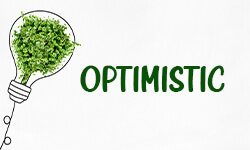
Numerous people frequently search for the definitions of various words, terms, and phrases in the English language. However, not all of these words are commonly used, and some people use them just because they’re trendy without knowing their actual origins. The purpose of this article is to give a thorough understanding of the term “optimistic”, including its correct spelling and where it came from.
Definition of “optimistic”
The term “optimistic” describes an attitude or worldview that focuses on the positive aspects of life and expects favorable outcomes. An optimistic person tends to believe that things will work out for the best and sees the “glass as half full” rather than “half empty”. This positive outlook often extends to various facets of life, including personal challenges, social interactions, and future events. Optimism doesn’t mean ignoring problems or hardship. It involves approaching such situations with a positive mindset, believing in one’s ability to overcome obstacles, and trusting that good things will ultimately happen. Optimism is typically contrasted with pessimism, which emphasizes negative outcomes and sees the darker side of situations.
Use of “optimistic” in a sentence
In the English grammar, “optimistic” functions as an adjective. It describes a noun, mostly a person, by attributing a hopeful or positive outlook to them. Here are three example sentences to illustrate its grammatical usage.
In each of these examples, “optimistic” serves to describe nouns or pronouns and convey a sense of hopeful expectation or positive thinking.
How to spell “optimistic” correctly
“Optimistic” is often misspelled as “optomistic”, “optemistic”, or “optamistic”. These misspellings may occur due to phonetic confusion because the word is typically pronounced quickly in casual speech, making it easy to overlook the correct spelling. Additionally, the word “optometrist”, which is related to eye care, might influence the incorrect spelling of “optimistic”. However, the only correct spelling is “optimistic”. The word is derived from the Latin word “optimus”, which means the best. Additionally, “optimistic” comes from the French word “optimisme” which was used to describe the philosophical belief that this world is the best of all possible words.
- “Opti-“ comes from „optimus”, meaning “best”
- “-mistic” is a suffix derived from “-isme” in French
Correct spelling
optimistic
Wrong spelling
optomistic
optemistic
optamistic
Synonyms for “optimistic”
It’s useful to include synonyms of the term “optimistic” in your communication, as they offer different words with similar meanings while also adding variety and nuance to your language. Using synonyms can also enhance your writing or speech by preventing repetition and redundancy. Below are four synonyms for “optimistic” with sample sentences.
| Synonym | Examples |
| Hopeful | She was optimistic that her efforts would pay off in the end. |
| She was hopeful that her efforts would pay off in the end. | |
| Positive | He has an optimistic outlook on life, always expecting the best. |
| He has a positive outlook on life, always expecting the best. | |
| Sanguine | The entrepreneur was optimistic about the success of her new venture. |
| The entrepreneur was sanguine about the success of her new venture. | |
| Upbeat | Despite the rain, they remained optimistic about the outdoor event. |
| Despite the rain, they remained upbeat about the outdoor event. |
FAQs
The term “optimistic” refers to having a positive outlook or expecting favorable outcomes in situations.
- “Optimistic” people focus on positive outcomes, expect the best in situations, and tend to downplay or overlook risks or drawbacks.
- “Pessimistic” people focus on negative outcomes, expect the worst in situations, and tend to emphasize potential risks or drawbacks.
- “Realistic” people consider both positive and negative outcomes, make assessments based on evidence and likelihood, and strive for a balanced view that considers both risks and opportunities.
- The opposite of “pessimistic” is “optimistic”
- The opposite of “optimistic” is “pessimistic”
- The opposite of an optimistic person is a pessimistic person. While an optimistic individual focuses on positive outcomes and expects the best in situations, a pessimistic individual focuses on negative outcomes and expects the worst.
numerous advantages for Canadian students:
- ✓ 3D live preview of your configuration
- ✓ Free express delivery for every order
- ✓ High-quality bindings with individual embossing

